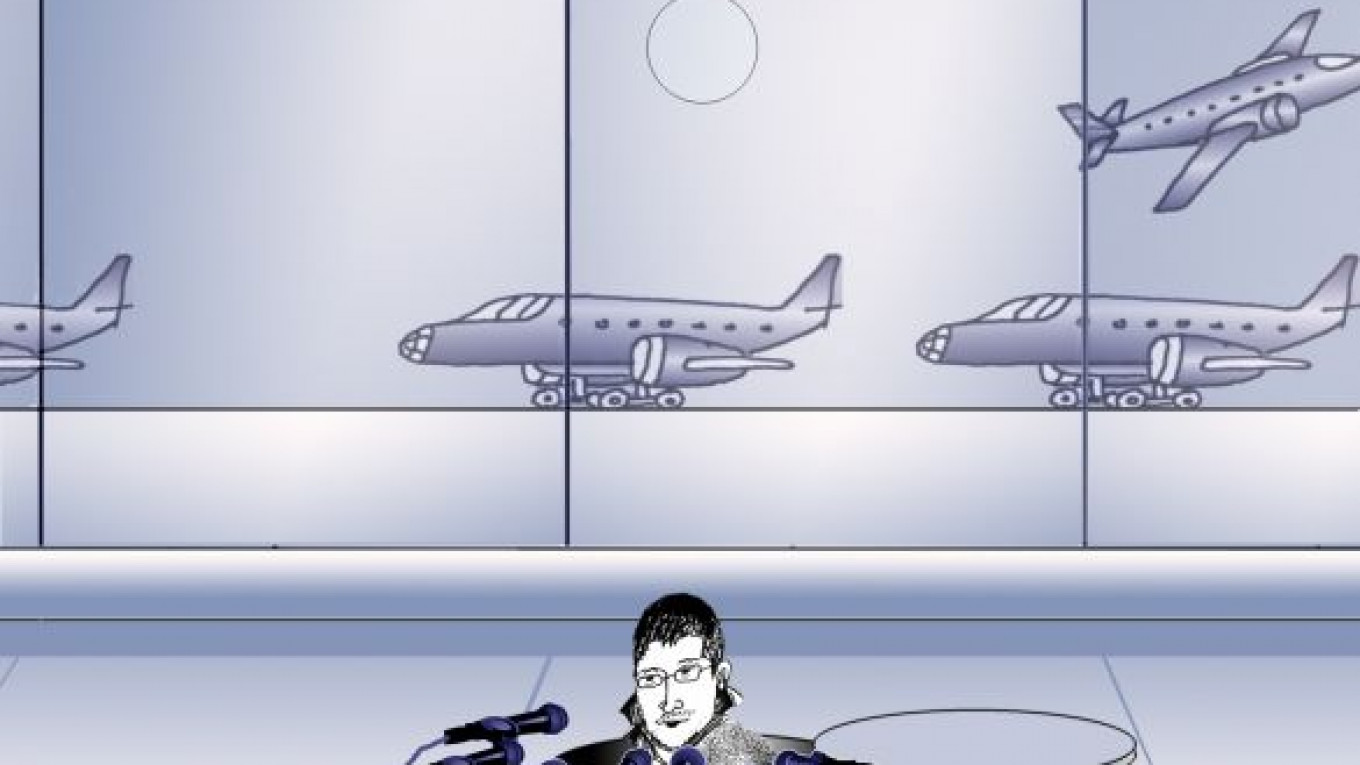It seems that the main news to come from Friday's meeting at Sheremetyevo Airport between human rights activists and former U.S. National Security Administration systems administrator Edward Snowden is that he is still in Moscow. And that's about it.
It was already known that he wanted to stay in Russia for at least a short period of time and that international human rights organizations were prepared to come to his defense. They had expressed that readiness even before this meeting, and the Russian representatives of those organizations only confirmed that support after Snowden's news conference. But no answers were forthcoming on the larger questions of whether Snowden would remain in Russia permanently or if he is just here temporarily as he searches for a permanent home in South America, where several countries have promised him asylum.
After the Snowden news conference, the real question everybody is asking is: Does the FSB control Snowden's every action?
In any event, Snowden's first public appearance in Moscow was a major disappointment — but not for everyone. The Kremlin continues to play the Snowden card successfully for political dividends. It somehow turned out that Snowden's decision to remain in Russia, at least for the time being, found support not only from Guardian blogger Glenn Greenwald, but also from international human rights organizations. After the meeting at Sheremetyevo, Amnesty International and Human Rights Watch found themselves in the interesting situation of having to ask President Vladimir Putin to do what he had been planning to do all along.
And although international human rights organizations were given the leading role in the meeting with Snowden, they had no say whatsoever over the script itself and had no influence on the choice of time, place or the circumstances of the meeting. And it turns out that in this case, those were critical factors.
Amnesty International and Human Rights Watch are usually very careful and conscientious in determining who is a victim of political persecution in need of assistance. No doubt, they were just as thorough in studying Snowden's situation and announcing, even prior to the meeting at Sheremetyevo, that the former NSA contractor should not be extradited to the U.S. — if for no other reason than that they believe that he won't be treated properly in pretrial detention and that he probably won't receive a fair trial in the U.S.
But when the question shifted to practical matters — namely, how to respond to Snowden's request for help in dealing with the Russian authorities regarding his asylum request — the organizations' Moscow representatives did not even attempt to get answers to several important questions, such as: How free is Snowden in his actions, and is he already under the strict control of Russian authorities, namely the Federal Security Service? If he is under their control, the government can easily provide asylum without any help from human rights organizations.
Considering that the human rights activists had no influence over the meeting itself, their only hope of clarifying the situation would have been to pose two direct questions to the fugitive: Where has he been staying during these past three weeks, and why does he continue refusing to meet with the media?
An answer as to his whereabouts would have indicated the degree to which Russian authorities are supporting him and would answer the question of how dependent he is on them. The question regarding his communication with journalists is equally important. If, as he claims, Snowden divulged classified information in the public interest, he should have the opportunity to openly put his case before the media. For example, he might have gone immediately from his meeting with human rights activists to meet with reporters, or else invited them into the transit zone. But journalists were excluded from Snowden's news conference.
In the end, human rights activists did not obtain answers to those questions, and the only people to emerge after the meeting were the invited guests, but not main hero of the show. For some reason, the activists were content to hear Snowden out and then leave without the opportunity to control, for example, where he would go after the meeting. That seems strange. If Snowden appealed to them for support, it means he was placing himself in their hands. Accordingly, they should be the ones to decide where he stays, what he does and how he communicates with lawyers, the authorities and so on.
In offering the human rights activists the opportunity to meet with Snowden, Russian authorities cleverly gave them an offer they simply could not refuse. The Snowden news conference with the participation of leading international human rights organizations worked to the advantage of Russian authorities far more than if they had simply released a video recording of Snowden reading a statement of unknown authorship and aired it on state-owned RT television.
Andrei Soldatov is an intelligence analyst at Agentura.ru and co-author of "The New Nobility: The Restoration of Russia's Security State and the Enduring Legacy of the KGB."
A Message from The Moscow Times:
Dear readers,
We are facing unprecedented challenges. Russia's Prosecutor General's Office has designated The Moscow Times as an "undesirable" organization, criminalizing our work and putting our staff at risk of prosecution. This follows our earlier unjust labeling as a "foreign agent."
These actions are direct attempts to silence independent journalism in Russia. The authorities claim our work "discredits the decisions of the Russian leadership." We see things differently: we strive to provide accurate, unbiased reporting on Russia.
We, the journalists of The Moscow Times, refuse to be silenced. But to continue our work, we need your help.
Your support, no matter how small, makes a world of difference. If you can, please support us monthly starting from just $2. It's quick to set up, and every contribution makes a significant impact.
By supporting The Moscow Times, you're defending open, independent journalism in the face of repression. Thank you for standing with us.
Remind me later.








